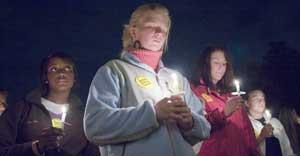
Last night women and men fought for the night.
From three corners of campus, students and faculty chanted to students yelling through red and white megaphones. The packs of people marched behind signs that read “One rape is too much!” and “We fight to take back the night!” while shouting a similar mantra.
“I think it is so important because so many people don’t speak out when they are sexually assaulted or raped,” Bryony Maitra, a graduate student in social work from UNC who is interning at the Women’s Center, said. “And if they hear others speak out, they may speak out as well.”
The Women’s Center and Take Back the Night Planning Committee organized this year’s event, which is the 19th at the University, according to Laci Weeden, the assistant director of the Women’s Center.
Rape and sexual assault are often misinterpreted as problems that only affect women, but Weeden, Marianne Turnbull, coordinator of health promotions, and Jon Barnwell, a crime prevention officer, emphasize that this isn’t a one-gendered fight.
“In a survey we took, it showed that men still think it’s a women’s issue, but every man has a woman that is important to them,” Turnbull said. “He may even be a secondary survivor.”
Turnbull teaches a class entitled Sexual Assault and Rape Prevention that meets every Wednesday from 3 p.m. to 5:30 p.m. and every week in November a class is held about self-defense against sexual assault.
Take Back the Night promotes awareness and support of victims — uniting a community to show victims they are not alone.
The event’s keynote speaker, Hope Bouldwin, flew from Atlanta to speak about her experience with rape.
At 16 she was hanging out and drinking with friends when she suddenly awoke naked on a picnic table being “gang-raped” by eight men. She said the men were people she knew, such as her friend’s boyfriends, and they drugged one of her drinks earlier in the night.
She said the event embarrassed her so much that she kept it a secret for 10 years and thought it was her fault for partying and drinking.
Bouldwin’s issues with her own rape mimic what most women feel who have had similar experiences.
“Most feel it is their fault for drinking or what they were wearing — but of course it is never their fault,” Weeden said. “You can never give consent to sexual intercourse by law if you are under the influence of alcohol or drugs.”
In the first six weeks of school, already six women on campus reported rape or sexual assault, according to Weeden. A number that is only a small representation of the actual cases.
“Most people don’t talk,” she said.
All of the instances in the past few years on campus involved alcohol and acquaintances, according to Weeden. And the fact that the girls know their assaulters make it a much more sensitive issue.
“A lot of times we have situations where the victim won’t press charges because it is somebody they know,” Barnwell said. “But you have to consider if you really know them — or are they just an acquaintance.”
The most vulnerable students on campus are in their first year because they are in a new environment with people they do not know very well, Barnwell said.
When a student is attacked and she contacts Campus Police, they try to support her and empower her to the best of their abilities.
“The first thing we try to do is empower [the victim], so we give the decision to press charges,” Barnwell said. “We want to give them the power to make their own decisions.”
But they are required by law to investigate the crime, which is what Barnwell said turns many victims off because they know their attacker.
If a woman reports a rape or sexual assault to the Women’s Center or Campus Police, options other than pressing charges are available on campus, including student conduct.
Justin Longino, a sophomore in business management, identified why many of the students came out for the event.
“We are fighting for what is right,” he said.